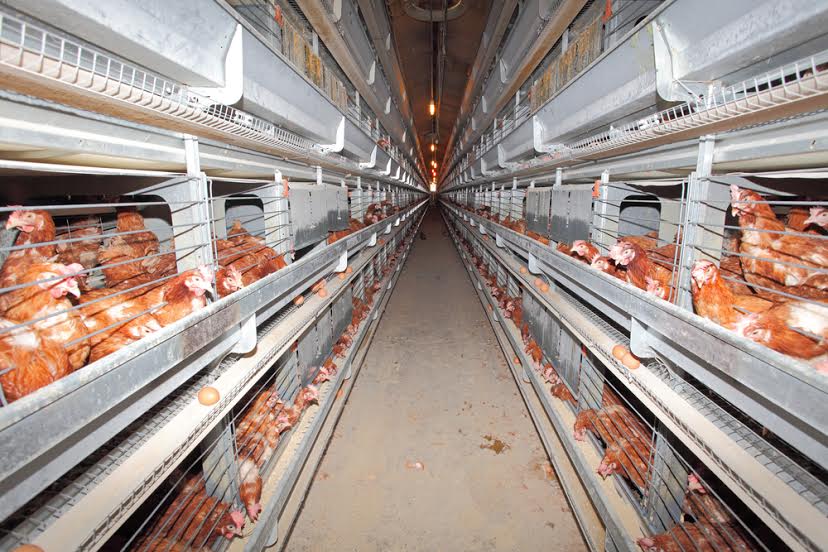The first time I saw a picture of a “battery cage,” I was horrified.
These tiny cages-barely the size of a piece of paper-comprise the entire living space provided to conventionally raised chickens. Chickens eat, sleep, defecate and are plied with antibiotics and growth hormones in this tiny space for their entire lives—often never seeing sunlight—until they are sent to slaughter and, eventually, dining tables around the country.
All sorts of livestock that Americans eat endure similarly brutish living conditions, prey to a system we collectively refer to as “factory farming.”
It’s not hard to see why this system developed. Agriculture is a major industry all over the world. There are more mouths to feed than ever. As we’ve moved off farms and developed more urban ways of life, we’ve become less connected to our food and where it comes from, and as a society, we’ve consolidated where we source our food.
Sure, commerce gives us access to strawberries during every month of the year, but approaching our food system as a profit-making venture encourages farming conglomerates to take shortcuts wherever they can to improve the bottom line. Ultimately, it’s the animals that pay the price.
Thankfully, people are becoming more aware of the dangers and cruelties that take place on factory farms, and taking action. For many of us, that means boycotting factory farm products.
Here are a few ways you can join the movement:
1) Find (and make) better places to shop.
Not everyone has access to a plethora of grocery store options, but for those of us who do, the first step is picking the right place the shop. Farmers’ markets are a great place to start. The types of vendors who take the time to come to farmers’ markets are part of your community, not the Tyson Foods of the agricultural world.
When I moved to Northern California a few years ago, I found my new farmers’ market through the U.S. Department of Agriculture’s search tool. It links to the markets’ websites, where you can often learn more about the vendors and their operations.
Farmers’ markets aren’t a panacea, especially in winter months. But you can keep up your factory farm boycott at the supermarket too. Virginia-based non-profit Humane Farm Animal Care classifies products as “Certified Humane” from farms that meet rigorous standards for animal treatment, and helps you find stores where they’re sold. They also have downloadable cards you can submit to your local store asking them to carry Certified Humane products.
Another option is to check out Animal Welfare Institute, which supports smaller family farms.
2) Make sure you’re buying humane and locally sourced products.
Locally sourced, humane foods provide a lot of benefits, from supporting our local economies and lessening our impact on the environment to reducing our consumption of pesticides and other chemicals. Most often, these small producers aren’t animal welfare violators, but it pays to read up on labels. While cage-free sounds great, not being caged doesn’t guarantee that animals have space to live or access to the outdoors.
The closer to home your food originated, the better chance you have of understanding exactly how the animals are treated.
3) Choose where you eat out carefully.
Let’s face it-living up to our food ethics is difficult when eating out. Unless you prepare the food yourself, it’s hard to know what’s in your dish. That said, with a little research, we can do our best to boycott factory farm products outside our homes, too. It’s pretty obvious that McDonald’s doesn’t prioritize ingredient quality over efficiency and cost of Big Mac production.
Other common restaurants do better. Chipotle, for example, made the news recently by temporarily removing pork from the menus of one-third of their restaurants when a supplier failed to meet their standards. Its CEO has made supporting humane agriculture an integral part of their brand.
In practice, though, you can’t always know a restaurant’s stance on factory farms (or whether they live up to it), before you walk in the door. That’s not just true for large chains like Chipotle, but also for your local eateries. It can feel uncomfortable, but don’t be afraid to ask your server a few questions about where the restaurant gets its food. Sure, you may remind them of a certain Portlandia sketch about a chicken, but this is a cause worth a couple awkward or stereotypical moments.
And if all else fails, you can always choose a meatless option. Which leads me to #4…
4) Go vegetarian (or vegan!).
This is perhaps the simplest and most obvious way to take a stand against factory farms. While it’s true that lots of produce is a product of industrial agriculture, we can be certain that our butternut squash soup and lentil salad didn’t involve the cruel slaughter of an animal. Vegetarians need to look out for the sourcing of eggs, cheese, butter and other animal-based products, but cutting out meat is a great first step.
I’ve been a vegetarian all my life, but nearly a decade ago I took my passion for protecting animals one step further and became vegan. So trust me, I know it’s a challenge, both in giving up some of my favorite flavors (camembert and brie-I really miss brie!), but also learning how to cook healthy and delicious meals. If quitting bacon and filet mignon cold turkey (no pun intended) sounds intimidating, it’s OK to take it slow. Start with “Meatless Mondays,” a new food trend that encourages families and institutions to forgo meat-based meals once a week. The internet is full of great vegetarian and vegan recipes to make the whole family happy and give you enough energy and protein to power you through the day.
5) Share your knowledge.
When I decide to forgo animal products, it’s a personal choice. When we all do, we become a movement. I loved the message in this provocative video (warning, it gets graphic) Sir Paul McCartney did for PETA. The awful conditions it documents really make you consider McCartney’s famous quote: “If slaughterhouses had glass walls, everyone would be vegetarian.” Sometimes, a little knowledge is all it takes to make someone change.
It can start at home: simply educating your friends and family about the horrors of factory farms and showing them easy ways to make sure their dollars don’t support them can make a difference. But don’t limit yourself to your personal network. These days, the internet gives each of us access to a wider world of people who share our values and tools to organize a movement of people unwilling to tolerate the status quo. Try starting a petition to turn your decision into something bigger. You can use it to show your local supermarket how many of their customers want more humane options for sale.
Or you could ask people to pledge to make any of the small changes suggested above, from adopting Meatless Mondays to buying humane products. Collectively, we can change an industry and improve a lot of four-legged lives in the process.
Relephant:
This is Factory Farming.
4 Ways That Meat Eaters Can Stop Supporting Factory Farms.
Author: Sharanya Prasad
Apprentice Editor: Leah Krol / Editor: Renee Picard
Photo: Author’s own









Read 0 comments and reply